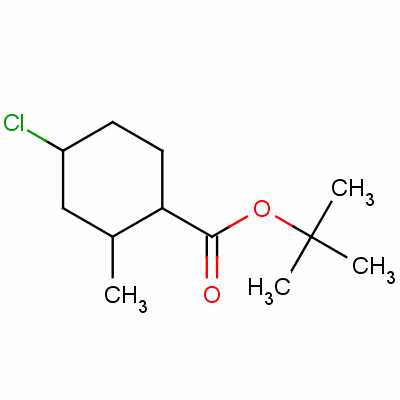ChemNet > CAS > 12002-53-8 4(lub 5)-chloro-2-metylocykloheksanokarboksylan 1,1-dimetyloetyloetylu
12002-53-8 4(lub 5)-chloro-2-metylocykloheksanokarboksylan 1,1-dimetyloetyloetylu
| Nazwa produktu: |
4(lub 5)-chloro-2-metylocykloheksanokarboksylan 1,1-dimetyloetyloetylu |
| Synonimy |
Trimedlure; ester 1,1-dimetylu kwasu 4-(lub 5)chloro-2-metylocykloheksanokarboksylowego; AI3-31560; Kapilure; ENT 31560; Kodeks chemiczny pestycydów EPA 112603; Pherocon MFF; 4(lub 5)-chloro-2-metylocykloheksanokarboksylan t-butylu; 4(lub 5)-chloro-2-metylocykloheksanokarboksylan 1,1-dimetyloetyloetylu; ester 4(lub 5)-chloro-2-metylo-, ester 1,1-dimetyloetylowy kwasu cykloheksanokarboksylowego; ester 4- (lub 5)-chloro-2-metylo-, tert-butylowy kwasu cykloheksanokarboksylowego; 4-chloro-2-metylocykloheksanokarboksylan tert-butylu; tert-butyl (1R,2R)-4-chloro-2-metylocykloheksanokarboksylan |
| Angielska nazwa |
1,1-dimethylethyl 4(or 5)-chloro-2-methylcyclohexanecarboxylate;Trimedlure; 4-(or 5)Chloro-2-methylcyclohexanecarboxylic acid, 1,1-dimethyl ester; AI3-31560; Capilure; ENT 31560; EPA Pesticide Chemical Code 112603; Pherocon MFF; t-Butyl 4(or 5)-chloro-2-methylcyclohexanecarboxylate; 1,1-Dimethylethyl 4(or 5)-chloro-2-methylcyclohexanecarboxylate; Cyclohexanecarboxylic acid, 4(or 5)-chloro-2-methyl-, 1,1-dimethylethyl ester; Cyclohexanecarboxylic acid, 4-(or 5)-chloro-2-methyl-, tert-butyl ester; tert-butyl 4-chloro-2-methylcyclohexanecarboxylate; tert-butyl (1R,2R)-4-chloro-2-methylcyclohexanecarboxylate |
| MF |
C12H21ClO2 |
| Masie cząsteczkowej |
232.7469 |
| InChI |
InChI=1/C12H21ClO2/c1-8-7-9(13)5-6-10(8)11(14)15-12(2,3)4/h8-10H,5-7H2,1-4H3/t8-,9?,10-/m1/s1 |
| Nr CAS |
12002-53-8 |
| EINECS |
234-416-0 |
| Struktury molekularnej |

|
| Gęstość |
1.03g/cm3 |
| Temperatura wrzenia |
284.2°C at 760 mmHg |
| Współczynnik załamania |
1.464 |
| Temperatura zapłonu |
127.3°C |
| Ciśnienie pary |
0.00302mmHg at 25°C |
| Symbole zagrożenia |
|
| Kody ryzyka |
|
| Bezpieczeństwo opis |
|
|